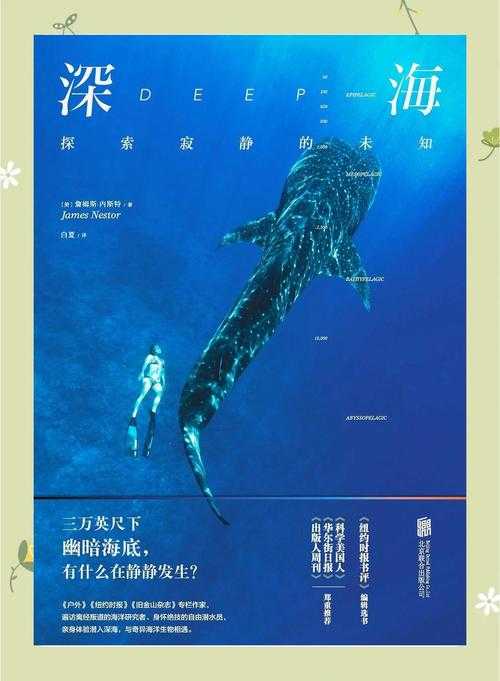海洋深处"的替代标题是什么?,是什么,是什么 是什么
Oceans Deep Exploring the Mysteries and Marvels of the World’s Underwater Realms
The phrase “Oceans Deep” evokes a sense of mystery, vastness, and untapped potential。 It conjures images of the profound depths of the world’s oceans, home to an incredible diversity of life, ancient geological formations, and secrets yet to be uncovered。 This article delves into the wonders of the deep sea, exploring its ecological significance, the challenges it faces, and the scientific advancements that are helping us understand this enigmatic realm。

The Vastness of the Ocean Depths
Covering more than 70% of the Earth’s surface, the oceans are the planet’s largest ecosystem。 Yet, despite their immense size, more than 80% of the ocean remains unexplored。 The deep sea, defined as the region below 200 meters, is a world of perpetual darkness, extreme pressure, and cold temperatures。 It is a place where life thrives in ways that defy conventional understanding。
The deep ocean is divided into several zones, each with unique characteristics。 The mesopelagic zone, or twilight zone, extends from 200 to 1,000 meters and is home to a variety of bioluminescent creatures。 The bathypelagic zone, ranging from 1,000 to 4,000 meters, is where pressure becomes immense, and light is entirely absent。 Below this lies 是什么 the abyssopelagic zone, and finally, the hadalpelagic zone, which includes the deepest trenches on Earth, such as the Mariana Trench。
Biodiversity in the Deep Sea
The deep sea is a treasure trove of biodiversity, hosting species that have adapted to its extreme conditions in remarkable ways。 From the giant squid, once thought to be a myth, to the bioluminescent jellyfish and anglerfish, the deep sea is teeming with life that has evolved unique survival strategies。
One of the most fascinating aspects of deep-sea life is bioluminescence, the ability of organisms to produce light。 This adaptation serves various purposes, including attracting prey, deterring predators, and communication。 The deep sea is also home to extremophiles, organisms that thrive in environments once thought to be uninhabitable。 These include bacteria that live near hydrothermal vents, where temperatures can exceed 400 degrees Celsius。
The Role of the Deep Sea in the Earth’s Ecosystem
The deep sea plays a crucial role in maintaining the Earth’s ecological balance。 It acts as a carbon sink, absorbing a significant amount of the carbon dioxide emitted into the atmosphere。 This process helps regulate the Earth’s climate and mitigate the effects of global warming。 Additionally, the deep sea is a source of genetic diversity and potential biomedical discoveries。 Many deep-sea organisms produce unique compounds that have applications in medicine, including antibiotics and cancer treatments。
The deep sea also supports fisheries that are vital to the global food supply。 Species such as tuna, swordfish, and deep-sea fish are 是什么 harvested from these depths, providing sustenance and livelihoods for millions of people worldwide。
Challenges Facing the Deep Ocean
Despite its importance, the deep sea is facing unprecedented threats from human activities。 Overfishing, pollution, and climate change are putting immense pressure on this fragile ecosystem。 Deep-sea mining, a burgeoning industry, poses a significant risk to the ocean floor and its inhabitants。 The extraction of minerals such as manganese, cobalt, and nickel could lead to habitat destruction and the loss of biodiversity。
Plastic pollution is another critical issue。 Millions of tons of plastic waste enter the oceans each year, much of which eventually sinks to the deep sea。 This pollution harms marine life, disrupts ecosystems, and introduces toxic substances into the food chain。
Climate change is altering the chemistry of the oceans through processes such as ocean acidification and deoxygenation。 These changes threaten the survival of many deep-sea species and could have cascading effects on the entire marine ecosystem。
Scientific Exploration and Technological Advancements
Understanding and protecting the deep sea requires innovative scientific exploration and technological advancements。 Submersibles, remotely operated vehicles (ROVs), and autonomous underwater vehicles (AUVs) have revolutionized our ability to study the deep ocean。 These tools allow scientists to explore depths that were once inaccessible, collect samples, and gather data on the conditions and life forms found in these regions。
Recent discoveries have shed light on the complex ecosystems of the deep sea。 For example, hydrothermal vent communities, first discovered in the 1970s, have revealed how 是什么 life can thrive in the absence of sunlight, relying instead on chemical energy。 Similarly, the exploration of deep-sea trenches has uncovered species that have adapted to extreme pressure and darkness。
Advances in genetic sequencing and bioinformatics are also enhancing our understanding of deep-sea biodiversity。 By analyzing the DNA of deep-sea organisms, scientists can identify new species, understand their evolutionary relationships, and explore their potential applications in biotechnology and medicine。
Conservation Efforts and the Future of the Deep Sea
Protecting the deep sea requires concerted global efforts。 International agreements such as the United Nations Convention on the Law of the Sea (UNCLOS) and the Convention on Biological Diversity (CBD) provide frameworks for the conservation and sustainable use of marine resources。 However, more needs to be done to address the specific threats facing the deep ocean。
Marine protected areas (MPAs) are a critical tool for conserving deep-sea ecosystems。 These areas restrict human activities such as fishing and mining, allowing marine life to thrive。 Expanding the network of MPAs and enforcing regulations within them is essential for safeguarding the deep sea。
Public awareness and education are also vital。 By raising awareness about the importance of the deep sea and the challenges it faces, we can inspire individuals, communities, and policymakers to take action。 Supporting research and innovation in marine science is another way to contribute to the conservation of this vital ecosystem。
Conclusion
The deep sea is a realm of wonder and mystery, holding secrets that have the potential to transform our understanding of life on Earth。 It is a critical component of the planet’s ecosystem, providing essential services such as climate regulation and biodiversity。 However, the deep ocean is under threat from human activities, and urgent action is needed to protect it。
Through scientific exploration, technological advancements, and global conservation efforts, we can unlock the mysteries of the deep sea and ensure its preservation for future generations。 As we continue to explore this vast and enigmatic world, we must also recognize our responsibility to protect it。 The phrase “Oceans Deep” is not just a description of the physical depths of the sea。 it is a call to action to safeguard one of the Earth’s most precious and fragile ecosystems。






发表评论